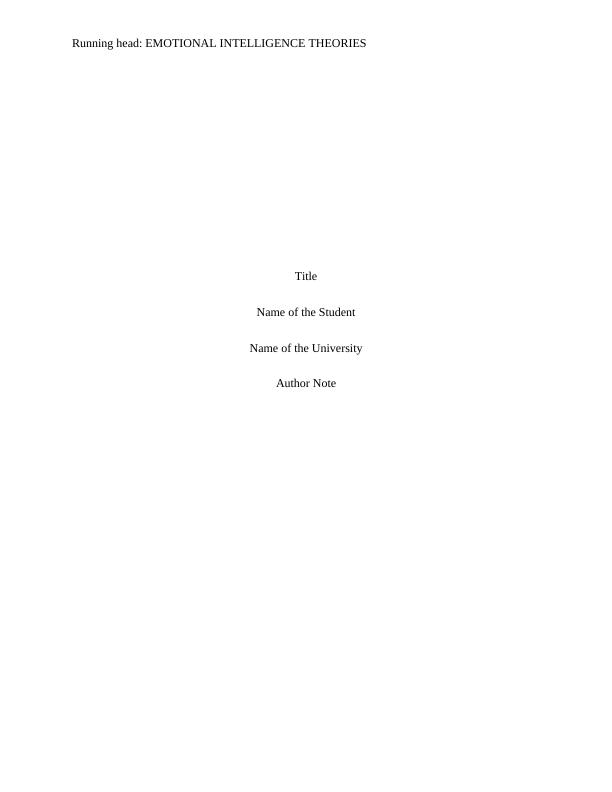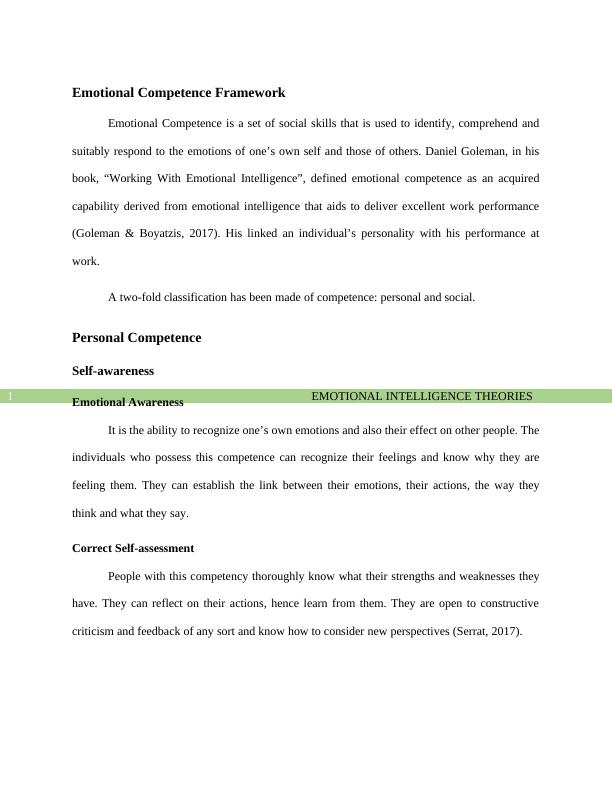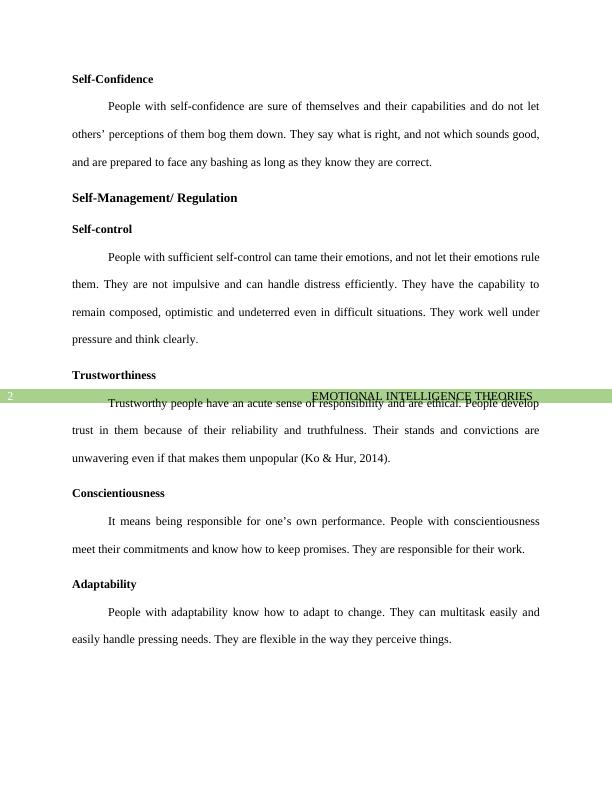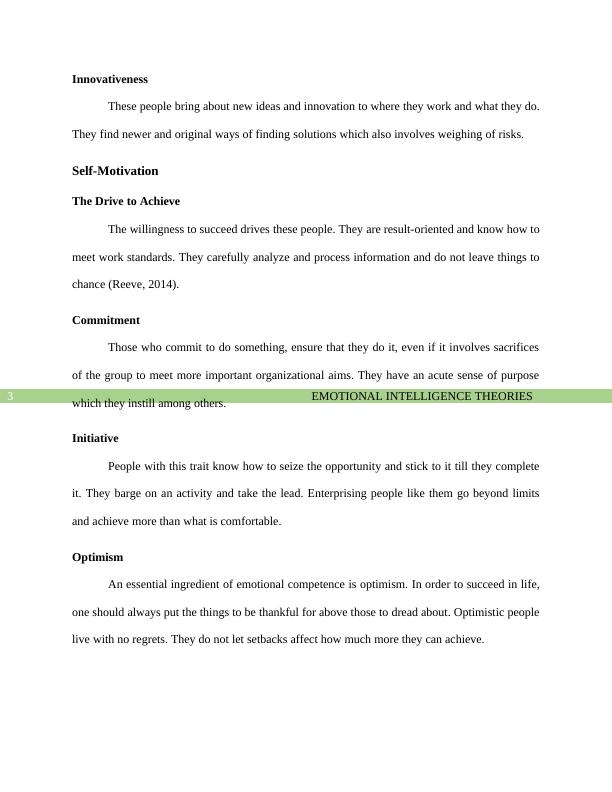Emotional Intelligence Theories
Added on 2022-11-28
12 Pages2647 Words182 Views
Running head: EMOTIONAL INTELLIGENCE THEORIES
Title
Name of the Student
Name of the University
Author Note
Title
Name of the Student
Name of the University
Author Note

EMOTIONAL INTELLIGENCE THEORIES1
Emotional Competence Framework
Emotional Competence is a set of social skills that is used to identify, comprehend and
suitably respond to the emotions of one’s own self and those of others. Daniel Goleman, in his
book, “Working With Emotional Intelligence”, defined emotional competence as an acquired
capability derived from emotional intelligence that aids to deliver excellent work performance
(Goleman & Boyatzis, 2017). His linked an individual’s personality with his performance at
work.
A two-fold classification has been made of competence: personal and social.
Personal Competence
Self-awareness
Emotional Awareness
It is the ability to recognize one’s own emotions and also their effect on other people. The
individuals who possess this competence can recognize their feelings and know why they are
feeling them. They can establish the link between their emotions, their actions, the way they
think and what they say.
Correct Self-assessment
People with this competency thoroughly know what their strengths and weaknesses they
have. They can reflect on their actions, hence learn from them. They are open to constructive
criticism and feedback of any sort and know how to consider new perspectives (Serrat, 2017).
Emotional Competence Framework
Emotional Competence is a set of social skills that is used to identify, comprehend and
suitably respond to the emotions of one’s own self and those of others. Daniel Goleman, in his
book, “Working With Emotional Intelligence”, defined emotional competence as an acquired
capability derived from emotional intelligence that aids to deliver excellent work performance
(Goleman & Boyatzis, 2017). His linked an individual’s personality with his performance at
work.
A two-fold classification has been made of competence: personal and social.
Personal Competence
Self-awareness
Emotional Awareness
It is the ability to recognize one’s own emotions and also their effect on other people. The
individuals who possess this competence can recognize their feelings and know why they are
feeling them. They can establish the link between their emotions, their actions, the way they
think and what they say.
Correct Self-assessment
People with this competency thoroughly know what their strengths and weaknesses they
have. They can reflect on their actions, hence learn from them. They are open to constructive
criticism and feedback of any sort and know how to consider new perspectives (Serrat, 2017).

EMOTIONAL INTELLIGENCE THEORIES2
Self-Confidence
People with self-confidence are sure of themselves and their capabilities and do not let
others’ perceptions of them bog them down. They say what is right, and not which sounds good,
and are prepared to face any bashing as long as they know they are correct.
Self-Management/ Regulation
Self-control
People with sufficient self-control can tame their emotions, and not let their emotions rule
them. They are not impulsive and can handle distress efficiently. They have the capability to
remain composed, optimistic and undeterred even in difficult situations. They work well under
pressure and think clearly.
Trustworthiness
Trustworthy people have an acute sense of responsibility and are ethical. People develop
trust in them because of their reliability and truthfulness. Their stands and convictions are
unwavering even if that makes them unpopular (Ko & Hur, 2014).
Conscientiousness
It means being responsible for one’s own performance. People with conscientiousness
meet their commitments and know how to keep promises. They are responsible for their work.
Adaptability
People with adaptability know how to adapt to change. They can multitask easily and
easily handle pressing needs. They are flexible in the way they perceive things.
Self-Confidence
People with self-confidence are sure of themselves and their capabilities and do not let
others’ perceptions of them bog them down. They say what is right, and not which sounds good,
and are prepared to face any bashing as long as they know they are correct.
Self-Management/ Regulation
Self-control
People with sufficient self-control can tame their emotions, and not let their emotions rule
them. They are not impulsive and can handle distress efficiently. They have the capability to
remain composed, optimistic and undeterred even in difficult situations. They work well under
pressure and think clearly.
Trustworthiness
Trustworthy people have an acute sense of responsibility and are ethical. People develop
trust in them because of their reliability and truthfulness. Their stands and convictions are
unwavering even if that makes them unpopular (Ko & Hur, 2014).
Conscientiousness
It means being responsible for one’s own performance. People with conscientiousness
meet their commitments and know how to keep promises. They are responsible for their work.
Adaptability
People with adaptability know how to adapt to change. They can multitask easily and
easily handle pressing needs. They are flexible in the way they perceive things.

EMOTIONAL INTELLIGENCE THEORIES3
Innovativeness
These people bring about new ideas and innovation to where they work and what they do.
They find newer and original ways of finding solutions which also involves weighing of risks.
Self-Motivation
The Drive to Achieve
The willingness to succeed drives these people. They are result-oriented and know how to
meet work standards. They carefully analyze and process information and do not leave things to
chance (Reeve, 2014).
Commitment
Those who commit to do something, ensure that they do it, even if it involves sacrifices
of the group to meet more important organizational aims. They have an acute sense of purpose
which they instill among others.
Initiative
People with this trait know how to seize the opportunity and stick to it till they complete
it. They barge on an activity and take the lead. Enterprising people like them go beyond limits
and achieve more than what is comfortable.
Optimism
An essential ingredient of emotional competence is optimism. In order to succeed in life,
one should always put the things to be thankful for above those to dread about. Optimistic people
live with no regrets. They do not let setbacks affect how much more they can achieve.
Innovativeness
These people bring about new ideas and innovation to where they work and what they do.
They find newer and original ways of finding solutions which also involves weighing of risks.
Self-Motivation
The Drive to Achieve
The willingness to succeed drives these people. They are result-oriented and know how to
meet work standards. They carefully analyze and process information and do not leave things to
chance (Reeve, 2014).
Commitment
Those who commit to do something, ensure that they do it, even if it involves sacrifices
of the group to meet more important organizational aims. They have an acute sense of purpose
which they instill among others.
Initiative
People with this trait know how to seize the opportunity and stick to it till they complete
it. They barge on an activity and take the lead. Enterprising people like them go beyond limits
and achieve more than what is comfortable.
Optimism
An essential ingredient of emotional competence is optimism. In order to succeed in life,
one should always put the things to be thankful for above those to dread about. Optimistic people
live with no regrets. They do not let setbacks affect how much more they can achieve.

End of preview
Want to access all the pages? Upload your documents or become a member.
Related Documents
Management in Leadership: Emotional Intelligence and its Association with Leadership Effectivenesslg...
|8
|1578
|322
Importance of Social Skills in Leadership and Business Successlg...
|6
|797
|404
Contemporary Management - Sample Assignmentlg...
|4
|796
|23
Importance of Emotional Intelligence in the Workplacelg...
|30
|4239
|246
Emotional Intelligence and Its Importance in Healthcare Leadershiplg...
|4
|680
|177
Developing and Using Emotional Intelligence for Improved Workplace Relationshipslg...
|13
|3884
|239